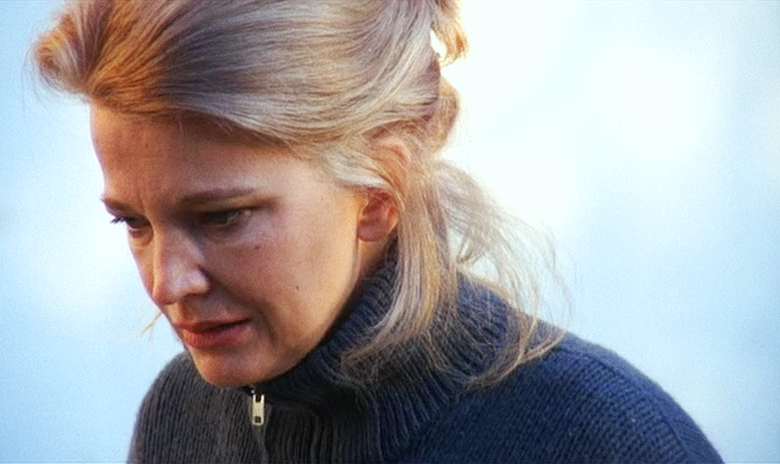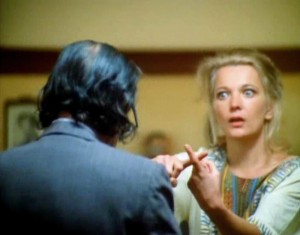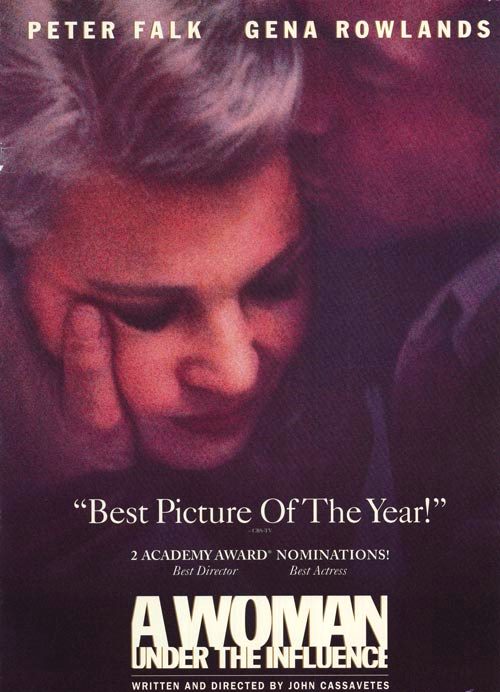
“Mabel is not crazy, she’s unusual. She’s not crazy, so don’t say she’s crazy.” – Nick
The best performance by an actress in film history is by Gena Rowlands. A Woman Under the Influence (1974) is the two and a half hour kitchen sink drama you only think you don’t have time for. It is a nervous breakdown movie, with Rowlands as the domestic housewife Mabel falling to pieces after accumulated years of depression and anxiety have gotten the better of her. Peter Falk is her insensitive, blue collar husband who is among the last to notice that something’s off-kilter with his wife. They share three children together, but it’s only after a play-date with other neighborhood children that her behavior is berserk.
Nick is the foreman of a construction crew that always seems to be working overtime. The kids are sent away for the night so Nick and Mabel can have an intimate night together. But he has to work, and she goes to a dive bar to get sloshy, spends the night with a stranger and wakes up in the morning feeling violated. The incident is also quickly forgotten by her, it’s just another disconnected segment in her frazzled, hectic life.
Before noontime, she is cooking spaghetti for Nick’s 10-man crew. Way too many men to handle under one small roof, but she feels obligated to be the entertainer. She asks one of them to dance even though it’s a non-dancing mood in the house, Nick gets curt and tells her to knock it off. Days later, she is incompetent with the children, but is bouncy and dancing when a parent comes over to collect his children. There will be a fight against this parent, with Nick’s mother, and a psychiatric doctor.
 The big scene of the film is the breakdown before the psychiatric doctor. This is Rowland’s tour de force of acting, behaving delirious and hysterical, yet doing it with such spontaneity that it has the direct force of a documentary. The psychiatrist is there to talk reason with her, but he is ready to convince Nick that she needs immediate institutionalization. Mabel believes she is just being giddy and jovial. Why should anybody stop her from being happy? But, of course, there is something wrong with her.
The big scene of the film is the breakdown before the psychiatric doctor. This is Rowland’s tour de force of acting, behaving delirious and hysterical, yet doing it with such spontaneity that it has the direct force of a documentary. The psychiatrist is there to talk reason with her, but he is ready to convince Nick that she needs immediate institutionalization. Mabel believes she is just being giddy and jovial. Why should anybody stop her from being happy? But, of course, there is something wrong with her.
Mabel is sent away for treatment, and is absent for several months. She returns, and some might say there isn’t anything permanently wrong with her. The months away have given her time to unplug from a chaotic domestic situation. Spend enough time with this film, and you will realize Nick is just as crazy. Maybe more than crazy, and certainly a clueless father. Mabel was lonely, mistreated, maligned to boredom and to Nick’s frenzied behavior for years. Could she have gone temporarily crazy after being with her husband Nick for too long? I’d say that’s true.
Nick has a welcome home party for her that doesn’t go as planned. Too many people are invited, it’s declared too overwhelming, so Nick double-backs on his plan for a big party and has most of them thrown out. The quieter set of friends remain, but when they get a dose of Nick’s hostility, they let themselves out. Soon after, Nick is seen yanking a dangerous weapon out of Mabel’s hand. The craziness between Nick and Mable will continue on.
Rowlands was the wife of the late writer-director John Cassavetes, who pretty much made low budget kitchen sink films for his entire career. He starred in movies like “The Dirty Dozen” (1967), “Rosemary’s Baby” (1968) and “The Fury” (1978) to collect the paychecks so he could make his own movies. Before I’d offer to call him a God, I’ll admit I had patience for only a few of his movies. Some of them were domestic turmoil drivel, but some of them are significant. “Shadows” (1959) was important as a major driving influence in independent cinema for its naturalistic acting. By “Faces” (1968) he was finding his footing, it was an intimate observation on adult relationships, and for the next fifteen years he made variations on that kind of cinema. “The Killing of a Chinese Bookie” (1976) has a peculiar spin on the street crime drama, and it’s a quirky original.
At this year’s Oscars, Cate Blanchett deservedly won for “Blue Jasmine” for playing a woman on a fast downward spiral into borderline schizophrenia. “A Woman Under the Influence” is the original “Blue Jasmine” or the blue collar version of it. Blanchett’s performance I’d rank among the all-time ten best, but I declare Rowlands the greater performance by a nose. Rowlands was Oscar nominated, but lost to Ellen Burstyn for “Alice Doesn’t Live Here Anymore.” Cassavetes was nominated for Best Director, his sole nomination in his career.
A lot of that has to do with Cassavetes’ handheld verite camerawork that follows Rowlands and the other actors in long, raw takes. Cassavetes proposed the idea of the scenario as a play first, not a movie. But it was Rowlands who said there would be no way she could play the role night after night without collapsing into exhaustion after the second night due to the demands of playing Mabel. Even without Rowlands’ astonishing performance, I want to stress this, the film would still stand the test of time because it is a fascinating and real portrait of abnormal psychology.
155 Minutes. Rated R.
CEREBRAL DRAMA / ADULT ORIENTATION / MASTERPIECE VIEWING
Film Cousins: “Faces” (1968); “Husbands” (1970); “Alice Doesn’t Live Here Anymore” (1974); “Blue Jasmine” (2013).





